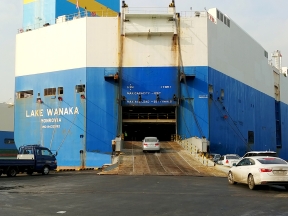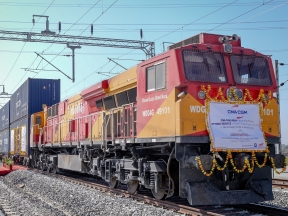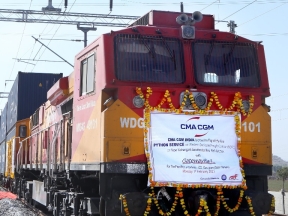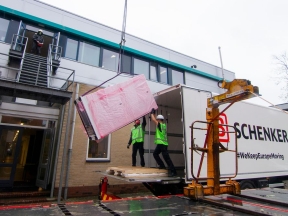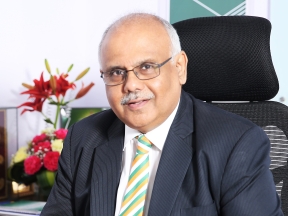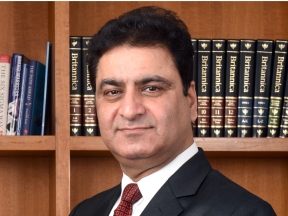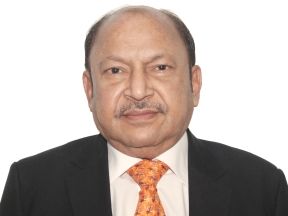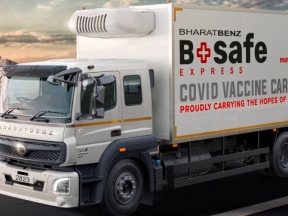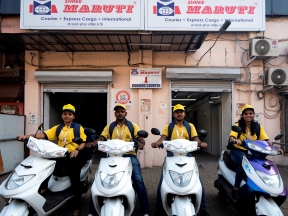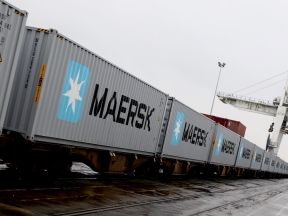CEVA Logistics has successfully completed a full RORO charter for almost 4,000 cars between South Korea and Libya, working in close cooperation with its parent company, the CMA CGM Group. The two companies chartered a specialist car-carrying RORO vessel as part of a cross-selling initiative. CEVA Logistics and CMA CGM teams worked in tandem to source and charter a specialist vessel along with contracting and loading. The January 2021 movement follows on from a similar successful charter in December 2019 where an equivalent number of cars were also moved from Incheon Port in South Korea to Misurata in Libya. For this second automotive charter, the vessel Lake Wanaka arrived at Incheon in early January where CEVA Logistics Korea teams monitored and supervised loading operations to the port. Almost 4,000 cars, SUVs and small trucks were successfully loaded over a four-day period despite difficult weather conditions including snow. In 2019, South Korea exported some 460,000 used cars overseas– primarily to the Middle East and Africa. In recent months, many exporters in Korea have expressed concern about limited transport options. Thus, CEVA Logistics and CMA CGM worked in close collaboration to offer pure car exporters in the country a specialist vessel as well as a local guarantee insurance company to eliminate any credit issues. Both teams also worked very closely with the Incheon Port Authority and those in Libya to ensure smooth port operations including vessel berthing and car loading, stowing and lashing and then timely unloading operations at destination. Do Young Kim Managing Director Korea, says CEVA Logistics, “Our extensive capabilities in the automotive industry were on full show with this RORO charter and the smooth collaboration with our colleagues at …
Read More »CMA CGM India introduces train service on Western Dedicated Freight Corridor
The CMA CGM Group, a world leader in shipping and logistics has announced the launch of CMA CGM – GatewayRail PYTHON Train Service on February 1, 2021 on Western Dedicated Freight Corridor (WDFC) from New Kishangarh Junction, Rajasthan. The two Double stack ‘Ship to Rail’ dedicated trains, one leaving from Mundra and the other from Pipavav, were clubbed at New Kishangarh Junction for the onward journey on the WDFC to New Ateli Junction and were split from there for GatewayRail’s Inland Container Depot – Gurugram (Garhi Harsaru). Western DFC will benefit industries in Gurgaon, Manesar, Rewari, Neemrana industrial areas of Haryana and Rajasthan and ensure faster rail transportation of international cargo between the National Capital Region and Mundra, as well as Port Pipavav ports in the state of Gujarat. On the achievement, Atit Mahajan, MD, CMA CGM India said, “The Python Rail service is one of the premier service and will be a game changer in the industry. This service is being run in the dedicated freight corridor and will significantly reduce the transit time. It will increase our cargo capacity and will also enhance our intermodal offerings to our customers. The Western dedicated freight corridor is one of the visionary projects of the Government of India and it surely will boost the existing intermodal infrastructure in the country.”
Read More »GatewayRail flags off ‘Python train’ on Western DFC
Gateway Rail Freight (GatewayRail) has undertaken operations of two double stacked trains in a python configuration on the Western DFC. These trains are dedicated services for CMA-CGM shipping line, the world’s fourth-largest container shipping company. From the two double stacked trains, one train arrived from Mundra port and the other from Pipavav port, both carrying import containers. It clubs two double-stack container trains to increase the efficiency and reduce the cost for customers. The trains were joined at New Kishangarh, Rajasthan (Madar Junction) for the DFC stretch of 306 km up to New Ateli, Rewari, Haryana. The government’s record allocation of Rs1.1 trillion for the Indian Railways has given specific thrust towards the completion of Dedicated Freight Corridor (DFC) by June 2022 that will further add impetus to rail infrastructure and will immensely benefit ports, exporters, and importers, shipping lines and container operators and other consumers of rail transport. The corridor will increase the transportation efficiency and reduce the cost for customers. GatewayRail’s train was also one of the two that were recently inaugurated by Prime Minister Narendra Modi on the Western Dedicated Freight Corridor (Rewari – Madar section). GatewayRail is already accruing benefits from this DFC section, and will continue to benefit as the rest of the Western DFC is commissioned in phases until final completion.
Read More »DB Schenker transforms its IT infrastructure with Microsoft Azure
DB Schenker collaborates with Microsoft to accelerate the logistics service provider’s transformation towards becoming a leading global digital logistics company. Within this collaboration, DB Schenker has set the next milestones for the evolution of its future ‘logistics-as-a-service’ approach. Markus Sontheimer, CIO/CDO, DB Schenker, says, “Our digital services will create value for our customers by making supply chains more data-driven and efficient. Using Microsoft Azure will boost our ability to seamlessly connect our cloud- based services with our real-world logistics solutions.” Ulrich Homann, Corporate Vice President & Distinguished Architect, Cloud + AI at Microsoft said, “Investments in digital technologies help companies reimagine their businesses and build more agile and resilient operations. By harnessing Microsoft Azure, DB Schenker enables organizations to redefine their supply chains and accelerate the delivery of new customer value.” DB Schenker will migrate key infrastructure services to Azure. This will enhance security, speed and scalability of DB Schenker’s cloud-based services. DB Schenker has already commenced the first cloud migration projects by using the Azure Migration Program in several country organizations. AMP supports with best practices, guidance, direct access to Azure engineers, tools and subsidized partner services. A new Big Data service on Azure will enable DB Schenker to analyse and optimise volumes, capacities and supply chain performance in near-real time.
Read More »Government must look at providing financial & infrastructural support to the sector: Spoton Logistics
As India sets sights on the Union Budget 2021-22, Abhik Mitra, MD & CEO, Spoton Logistics, stresses upon few key pain points of the logistics industry that must be addressed in this year’s budget. He says, “With logistics holding the economy together even during the COVID-19 pandemic and set to play an even more crucial role in current times, the government must look at providing the much-required financial and infrastructural support to the sector. With India’s aim to reduce the logistics cost from the current 14 per cent of GDP to less than 10 per cent, it is imperative for the government to bring about a ground-breaking transformation in the logistics sector that encapsulates an increased use of digital technologies and automation. We urge the government to take dedicated measures to boost digitalisation so as to drive transparency and bring in the required predictability in logistics. Another key step that the government must take is to bring fuel under the purview of GST as this could fundamentally transform the Indian logistics sector. While goods are moved from one place to another, it is generally required for the transporter to carry a hard copy of the invoice, the government must also do away with this by way of e-way bill digitalisation.” “On the demand side, the government can look at driving the overall consumption which could be achieved by reducing personal income tax and GST on various goods, etc,” he adds.
Read More »Additional taxes levied on petrol and diesel prices, leading to high cost of transportation, should be considered: Blue Dart
According to Aneel Gambhir, CFO, Blue Dart, “While the onset of the pandemic affected the logistics sector, the sector has stood the test of time by supporting the movement of essentials and non-essentials when the nation was under lockdown. We expect the government’s full support to revive the sector and in order to do so, the logistics cost should be reduced from the present 14 per cent of GDP to less than 10 per cent since high logistics cost is impacting the competitiveness of domestic goods in the international market. Investing in better road infrastructure will fasten the movement of goods, help in reducing the costs and improve turnaround time for vehicles. Improvement of air infrastructure and connectivity will help the logistics industry to boost this sector. Electric vehicles have the potential to aid in last-mile delivery while also adding to environmental protection. The Government should incentivize the use of electrical vehicles and focus on strengthening the infrastructure for enabling easy manufacturing and usage of EVs and EV-related elements. Similarly, Government could consider rolling back additional taxes levied on Petrol and diesel prices. The additional taxes levied during the pandemic are hurting the cost of transportation. It is also leading to high inflation.”
Read More »We expect enhanced allocation to Indian Railways to complete Western DFC Project: Gateway Distriparks
The year 2020 has disrupted and challenged the logistics sector in different ways. However, the logistics sector still serves as one of the key economic drivers because of its thriving infrastructure and improved connectivity. Sharing his expectations from Union Budget 2021, Prem Kishan Dass Gupta, Chairman & Managing Director, Gateway Distriparks, says, “We expect strong support and initiatives for the EXIM industry which will help in increasing volumes. We hope the budget will have enhanced allocation to the Indian Railways for completion of the Western Dedicated Freight Corridor (DFC) project at the earliest, so that the industry can benefit from the new rail infrastructure at this time when the focus is to increase manufacturing in India. This will immensely benefit ports, exporters, importers, shipping lines, container train operators and other consumers of rail transport.” “As a Logistics company, we are looking at government’s increased investment in infrastructure, which will provide further impetus to boost the overall economy,” he adds.
Read More »Daimler Trucks launches BharatBenz reefer truck for vaccine transportation in India
Daimler India Commercial Vehicles (DICV) has unveiled the BharatBenz ‘BSafe Express’, a specialized reefer truck designed for the safe transportation of COVID-19 vaccines. Equipped with state-of-the-art connectivity, the BSafe Express uses newly developed refrigeration units that ensure the temperature and stability of the vaccines is accurately monitored and maintained at all stages of delivery. The reefer is mounted on the BharatBenz 2823R heavy-duty chassis.At the premiere of the truck in the Indian capital Delhi, Satyakam Arya, Managing Director and CEO, Daimler India Commercial Vehicles said, “The combination of a strong, reliable chassis with a lightweight, insulated reefer and state-of-the-art connectivity device makes BharatBenz’s ‘BSafe Express’ the perfect solution to India’s cold-chain infrastructure challenge. With this truck, we can deliver vaccines in perfect condition to even the most remote destinations, bringing hope of a return to normalcy to over 1.3 billion people.” India has recently started its corona vaccination campaign, aiming to vaccinate 300 million people by July 2021. The BharatBenz BSafe Express offers a solution to Indian logistics companies in the efforts to contribute to the nation’s goal of bringing COVID under control as quickly as possible. A daunting challenge in the second most populous country in the world.
Read More »Shree Maruti Courier launches industry-first green energy supply chain, join hands with Hero Electric
Shree Maruti Courier Services has launched an eco-friendly delivery service using electric two-wheelers in five cities in India. The Ahmedabad headquartered company has kicked-off a pilot project in five major cities in India including Ahmedabad, New Delhi, Mumbai, Pune, and Chennai. It has joined hands with Hero Electric, India’s largest electric two-wheelers company, and became the first company in the courier and logistic sector to initiate a novel concept of creating a green energy supply chain. The company plans to expand this service into 20 cities and to add more than 500 E-bikes in the financial year 2021. Speaking about the initiative, Ajay Mokariya, Managing Director, Shree Maruti Courier Services said, “We have launched a pilot project in the five cities in India and the response for the same has been very encouraging. The courier and logistics industry is very price sensitive and fuel cost is an essential element in our business. With the E-bike adoption, we would be able to reduce the fuel cost significantly, contribute to reducing carbon footprints, and provide competitive services compare to the traditional delivery tools. The delivery persons will also find it easy and comfortable to deliver the parcels within the city. This model seems more sustainable and cost-efficient for us and we are planning to roll-out the same in multiple cities in a coming time”. Speaking about the association, Sohinder Gill, CEO, Hero Electric said, “It has been our endeavor to partner with more and more businesses to convert their fleets into electric two-wheelers. We are happy to have partnered with Shree Maruti Couriers who are among the largest in our country to create this green corridor with our bikes. The new Nyx-HX …
Read More »Maersk moves first-ever containerised cargo by rail from East Coast to West Coast in India
To overcome the challenges of space availability and connectivity, Maersk has provided landside movement of cargo from Kolkata to Nhava Sheva port on a dedicated train for its customer. Offering a truly integrated container logistics solution, Maersk also provided customs clearance in addition to ocean shipping. Flexibility and reliability in supply chains have become an important aspect for importers and exporters, especially after the COVID-19 pandemic hit global trade last year. Indian exporters have been exploring possibilities of scaling up production and shipping it out of India to global markets. The underlying challenges in the post-COVID ecosystem, however, have limited the opportunities from time to time for such exporters – one of the biggest challenges being that of space availability from certain pockets within the country. Building a truly end-to-end solution for the customer, Maersk offered to move the Doha-destined cargo on a dedicated train from Kolkata to Nhava Sheva port – this was the first time that such a movement took place from the East Coast of India to the West Coast – and then connecting the cargo to the required vessel. Not only was the landside transportation taken care of, Maersk also executed export customs clearance of the cargo before loading it on to the vessel. The cargo is expected to reach its destination in Doha over the coming days. Commenting on the historic move in landside logistics in India, Steve Felder, Managing Director, Maersk South Asia said, “At Maersk, we believe in enabling trade by designing solutions that connect and simplify our customers’ supply chains. We have recognised the challenges that the COVID-19 pandemic has triggered in the ecosystem and are innovating solutions that didn’t exist in …
Read More » Cargo Breaking News
Cargo Breaking News
